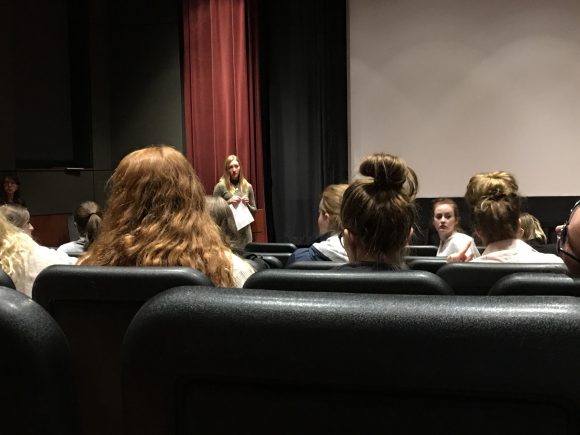Maddie Conley
Online Editor
Opinion
A group of middle school girls sits around a table serious and straight-faced. This is an uncommon occurrence.
Being a leader at my church’s youth group, I have the privilege of meeting with a group of young girls every Sunday night to talk about life. The topic of conversation this week was sex and society.
The discussion quickly led to girls revealing their fears about being harassed. One girl mentioned she gets scared that a guy will try to overstep boundaries verbally or physically and she won’t know what to do.
This is a middle school girl.
She should be worrying about the next science fair project or what’s for lunch in the cafeteria, not worrying about whether someone is going to try to touch her or send her sexual pictures.
 It’s National Sexual Assault Awareness Month, and after an outbreak of victims coming forward with their stories, it seems like it’s been National Sexual Assault Awareness Year.
It’s National Sexual Assault Awareness Month, and after an outbreak of victims coming forward with their stories, it seems like it’s been National Sexual Assault Awareness Year.
The National Sexual Violence Resource Center says “We understand sexual violence to be an overarching term that includes an array of behaviors, both physical and non-physical, that constitute unwanted or age-inappropriate sexual activity and can impact people of any age, gender, race, religion, ethnicity, identity, etc.”
With one in four girls and one in six boys facing sexual abuse before they turn 18 (nsvrc.org), the middle school girls’ fears are valid.
The NSVRC also reports that about a quarter of women and 15 percent of men in college will be victims of forced sex. A staggering truth shows that 90 percent of assault victims on college campuses don’t report it.
“I think the massive amount of under-reporting is upsetting and disappointing, but also understandable, Hannah McBride Project Coordinator of Human Resources said. “The only way action can happen is if a report is made…but reporting in and of itself can be a tough thing to do. Reporting on a college campus often means you are reporting a friend or acquaintance within this very central community.”
No wonder the young girls coming up behind us feel unprepared. We aren’t prepared.
Sexual assault and harassment are not going to go away. A month of awareness isn’t going to rid us of this inhumane treatment. I fear that unprepared girls become vulnerable women who become victims.
I also fear that we are promoting “be cool” and “be fun” over “be smart.” Unwanted touch is not flirting. Making sexual comments is not flirting.
“It is important to take yourself and your own experiences seriously, as well as your friends’ experiences, and to know what constitutes harassment or assault,” McBride said. “Harmless flirting only works if both parties are interested and the behavior is not demeaning, threatening, coercive, or offensive.”
When harassment is dismissed at a young age, it can lead to abuse in the future.
 A screening of the domestic abuse documentary Behind Closed Doors was held at Parmer Cinema this past Wednesday, as part of Messiah’s month of sexual assault awareness. The film detailed the stories of three British women who were victims of abusive relationships, showcasing their court processes, personal hardships, and emotional recoveries.
A screening of the domestic abuse documentary Behind Closed Doors was held at Parmer Cinema this past Wednesday, as part of Messiah’s month of sexual assault awareness. The film detailed the stories of three British women who were victims of abusive relationships, showcasing their court processes, personal hardships, and emotional recoveries.
Those in attendance also received a handout detailing the common behaviors of an abusive relationship, and why just leaving is not as easy or simple as expected. Often times, victims of abuse contemplate leaving their relationship seven times before actually going through with it, and that they often are subjected to at least fifty instances of abuse before leaving.
Emily Hess, ’18, organized the screening event and believes there is a link between harassment and partner abuse. “In our society, there is an expectation that women will accept unwanted advances— ‘harmless flirting’— and we need to dismantle that expectation,” Hess said.
A study done by the organization Stop Street Harassment found that about 65 percent of women have experienced street harassment (http://www.stopstreetharassment.org). This includes unwanted whistling, leering, sexist slurs, persistent requests for someone’s name, number or destination after they’ve said no, sexual names, flashing, groping, sexual assault, etc. that takes place in a public place.
“Excusing unwanted advances like street harassment as “harmless” can create a slippery slope to allowing more extreme forms of violence against women,” Hess added.
Hess described the Power and Control Wheel, a graphic that shows the different tactics abusers use to keep their victims in a situation of powerlessness. “Any kind of harassment stems from an imbalance of power–real or perceived–where the abuser believes that he or she is justified in the actions against perpetrated the victim,” Hess said.
These statistics are not going to improve if our girls don’t know how to speak up or if they don’t think they can. The cycle will continue and girls will not learn how to confront harassment.
“It is valuable to grow in how we address instances of crossed boundaries without ‘just playing nice’ or dismissing it,” McBride said. “The loudest voices are often the ones that are heard.”
 We need to be mentors and sisters in Christ, looking out for the girls coming up behind us. They deserve to be told that pressuring is not okay, inappropriate touching is harassment and sexual jokes do not equal flirting.
We need to be mentors and sisters in Christ, looking out for the girls coming up behind us. They deserve to be told that pressuring is not okay, inappropriate touching is harassment and sexual jokes do not equal flirting.
Let’s correct out this power imbalance and make sure girls feel safe. Let’s give our girls back their math class stress and lunch menu questions.
~Thanks to Matt Dekonty for covering “Behind Closed Doors” Movie Screening~

